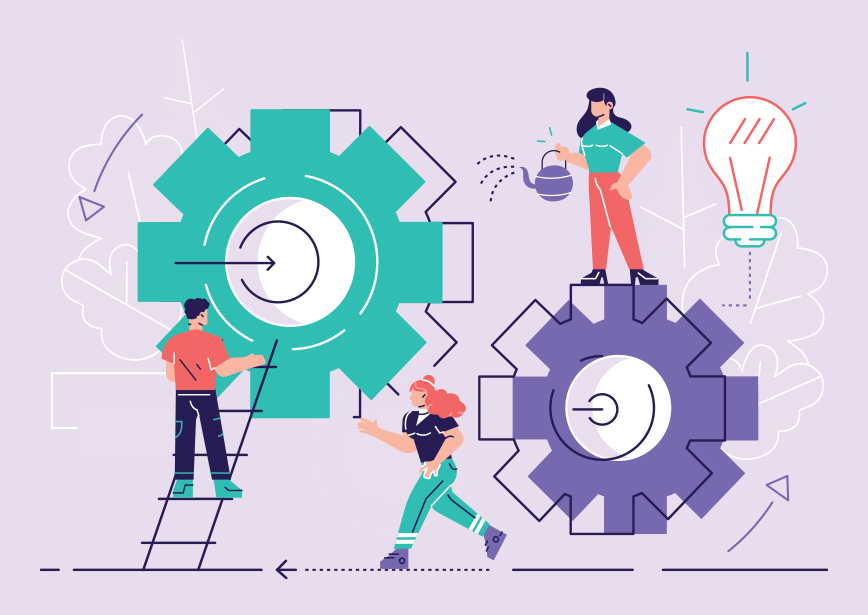Challenge Accepted
Fifty-four winning projects emerge from the NUS Resilience and Growth Innovation Challenge.

While the year that passed is unlikely to be recalled fondly by many, it did show the mettle of the graduating classes of 2018, 2019 and 2020. Dealing with what COVID-19 threw at them — specifically in the way of potentially long-term economic uncertainty — encouraged the graduates to participate in the first-ever NUS Resilience and Growth Innovation Challenge. This has resulted in some innovative and sometimes completely unexpected solutions to daunting problems.
Held in part to commemorate the University’s 115
th anniversary, the Challenge — which ran from 1 June to 31 December 2020 — received 88 submissions. Out of these, 54 projects were evaluated and selected as the winners of the 2020 contest, which was broken down into three segments: Make Our People Better; Make Our Society Better; and Make the World Better (see sidebar). There were 22 winners in the “People” category; 16 in the “Society” category; and 16 in the “World” category. The winning projects will go on to be funded by NUS to the tune of $50,000 for six months. This grant can be used to pay a stipend of up to $1,200 per month per project member for the duration of the project.
A full list of the winners is available here.
For Professor Simon Chesterman, Dean, NUS Faculty of Law and Co-Chair of the Better People category, the Challenge proved both surprising and personally rewarding. “I don’t think I could have possibly predicted all the ways in which our recent graduates decided that they could help our people,” he said. “From urban farming to taekwondo for wayward youth; from science kits for underprivileged children to supporting persons with disabilities entering the gig economy — using every medium from music to posters to dedicated apps — it was a pleasure to play a tiny role in giving them a start. This was very much a hand-up, rather than a hand-out.”
It looks like the pandemic and its effects did not stop NUS students from conceptualising and developing an array of valuable proposals, with a helping hand from the Challenge. In fact, the current crisis seems to have galvanised graduates to be more creative and innovative in developing solutions to the problems they identified in their chosen challenge categories. “Many of the applications were of a very high quality,” commented Professor Robbie Goh (Arts and Social Sciences ’88), Dean, Faculty of Arts and Social Sciences, and Professor of Literature in the Department of English Language and Literature. “There was a range in terms of focus, relevance and feasibility in the applications, and we did have to reject some that did not clear the bar. But the good applications were really of a high standard.”
The Categories Explained
Make Our People Better – How can we improve the quality of life for our people? This includes improving home-based learning, strengthening mental well-being, and finding ways to maximise human potential.
Make Our Society Better – How can we make our society more cohesive and purposeful? This includes fostering togetherness, reducing inequality, improving happiness, and giving society greater meaning and purpose.
Make the World Better – How can we make the world better? This includes mitigating the effects of climate change, enhancing food security, and ensuring post-COVID-19 safety. The panel prioritised projects that address challenges that are of great relevance to Singapore and the world.
A Better Way Forward
Besides spurring the students on, it is possible that the upheaval in Singapore’s economy and society due to the pandemic may have led them to believe that now is the right time to make some positive changes — essentially, to Make Things Better, which was the thread that ran through the three challenge categories. According to the challenge website, the judging committee hoped to be presented ‘thoughtful and innovative projects that will have a clear impact for the social good, particularly in identifying and addressing issues, concerns and groups that have not received sufficient attention to date.’
In this respect, the teams did not disappoint. “The Innovation Challenge brought out what I always find most admirable in our graduates and alumni: creativity, enthusiasm and a passion for making a difference,” commented Prof Chesterman. “We consciously encouraged a diverse range of ideas — some will work, some will fall flat, but all will learn from and be encouraged by this experience. The proposals ranged from fully thought-through ventures to idealistic longshots. Our panel took the view that even those whom we did not fund should benefit from the experience of pitching to a panel of sympathetic but critical judges.”
Adding his thoughts, Co-Chair of the Better Society theme Prof Goh pointed out how many of the projects tackled a very pertinent problem in society. “I was personally very pleased to see a number of projects that showed concern for the elderly. The elderly are a particularly vulnerable segment of our population, especially because of COVID-19, which has only exacerbated their isolation and made them prey to scams and dependent on others for things like food delivery and companionship.”
Co-Chair of the Better World theme, Professor Tulika Mitra, complimented the teams for developing clever solutions despite the restrictions on physical movement due to the pandemic. She cited the “Mangrove Living Shorelines”, “LOTA: Locally Optimised Toilet for All” and “Equity Lab” projects for their out-of-the-box approaches to their identified problems. “I am proud and inspired by the creativity, enterprising nature and perseverance of the NUS graduates and their passion to make the world better through cross-border, collaborative efforts. Our future is in good hands,” said Prof Mitra, who is the Provost’s Chair Professor of Computer Science and Vice Provost (Academic Affairs) at NUS.
![]()
The Innovation Challenge brought out what I always find most admirable in our graduates and alumni: creativity, enthusiasm and a passion for making a difference.
Professor Simon Chesterman, Dean, NUS Faculty of Law
Text by Ashok Soman.